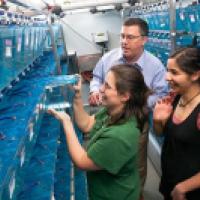Introduction
The biology major at Cornell guides students through foundation courses in math, physical sciences, and a core curriculum for breadth in biology. Students also select a Program of Study for depth in an area of interest. Neurobiology and Behavior (NBB), one of the 14 Programs of Study, is flexible, integrative, and at the frontier of modern biological science.
For more detailed information on the biology major, click here to visit the Office of Undergraduate Biology (OUB) website.
Requirements for the NBB Program of Study
Students are required to take the two introductory courses BIONB 2210 - Neurobiology and Behavior I: Introduction to Behavior and BIONB 2220 - Neurobiology and Behavior II: Introduction to Neuroscience with discussion sections (4 credits per semester), and 7 additional credits. See in-depth information and videos of our introductory courses. The 7 additional credits must include at least one advanced BIONB course of 3 or more credits from the 3000 level or above. ”Topics” courses (BIONB 4200s and BIONB 7200s), independent study (BIOG 4990), BIONB 3215, ENTOM 3755, PSYCH 4230 and PSYCH 4260/PSYCH 6260 may be used toward the additional 7 credit requirement, but do not qualify as advanced courses.
Note:
Students who declare the concentration in Neurobiology and Behavior (NBB) after taking BIONB 2210 or BIONB 2220 for only 3 credits must still take the 1-credit discussion section in BIONB 2210 and BIONB 2220. To arrange this, the student should consult the course directors.
Although not required, the faculty of NBB encourages students to get laboratory or field experience through coursework or independent research. Students are also encouraged to take one of the Special Topics courses (BIONB 4200), which may be taken as a capstone experience.
Advanced NBB Courses
Click here to browse course offerings for the current and upcoming semester.
* = offered in alternate years
Fall:
- 3240 Biopsychology Laboratory
- 3300 Intro to Computational Neuroscience*
- 3500 Neuro AI: Bridging Brains and AI*
- 3920 Drugs and the Brain *
- 3950 Molecular & Genetic Approaches to Neuroscience*
- 4320 Neural Circuits for Motor Control in Health and Disease*
- 4380 Computational Methods for Neuro & Behavior*
- 4700 Biophysical Methods
- 4720 Visual Ecology*
Spring:
- 3215 Gender & the Brain
- 3220 Hormones & Behavior
- 3280 Biopsychology of Learning & Memory
- 3690 Chemical Ecology
- 4140 Principles of Pharmacology
- 4220 Modeling Behavioral Evolution*
- 4260 Animal Communication*
- 4300 Experimental Molecular Neurobiology
- 4350 Mechanisms of Animal Behavior *
- 4460 Plant Behavior and Biotic Interactions, Lecture
- 4461 Plant Behavior and Biotic Interactions, Laboratory
- 4530 Speciation: Genetics, Ecology, and Behavior*
- 4560 Neural control of Food intake & Energy Metabolism*
- 4740 Neural Dynamics of Learning, Memory, Decision Making*
- 4750 Evolution & Neural Basis of Sleep*
- 4910 Principles of Neurophysiology
Scheduling Courses in the NBB Program of Study
Students majoring in Biology are encouraged to take two of the Core Biology Courses and the Investigative Biology Laboratory during their freshman year (see chart below). For those deciding to pursue the NBB Program of Study, the core courses in Evolution, Physiology, Cell and Developmental Biology are appropriate. If scheduling permits, majors should also complete a year of introductory chemistry during the freshman year because it is a prerequisite for several NBB courses including BIONB 2220. BIONB 2210 and 2220 can be taken in any order. The NBB faculty recommends taking BIONB 2210 and 2220 in the sophomore year because a number of advanced courses, which require them as prerequisites, are offered only in alternate years.
Students should consult with their faculty advisor or the NBB website when planning courses.
Sample Undergraduate Schedule:
| Freshman | Sophomore | Junior | Senior |
|---|---|---|---|
| Evolution | NBB 2210 | NBB advanced | NBB advanced |
| Physiology | NBB 2220 | Genetics | |
| Bio Lab | Organic Chem. | Biochemistry | |
| Chemistry | Bio (core) | Physics | |
| Chemistry | Math | Physics | |
| Math |
Undergraduate Research
Many of the laboratories in the Department of Neurobiology and Behavior offer opportunities for undergraduate students to do original research. Spaces may be limited and the criteria for being accepted into a lab may vary considerably between research groups, but students with curiosity, ability to ask good questions, and motivation to explore the unknown beyond the classroom will find research richly rewarding. It is an important first step for students wishing to go toward graduate school or for an M.D./Ph.D degree.
How to get started:
The NBB website offers information about research projects and publications, and the Office of Undergraduate Biology offers information to guide students seeking research opportunities. Ultimately, the decision about what to work on and where depends on the interests of the student and the individual mentor, so it is a good idea to inquire about the possibility for research directly with individual researcher in the area of interest. Try to narrow your search by departments, and by faculty research statements, but be aware of the possibility of working with a graduate student or post-doc on a project within a research group.
Research takes time, so it is good to start early. Many students get started in a research lab during their sophomore year. Many students will spend one summer or more in a lab. If the project is productive and successful, it may result in an honors thesis or a publication.
Clubs and Resources
Undergraduate Student Awards
A list of our Undergraduate Student Awards can be found here: Undergraduate Student Awards


